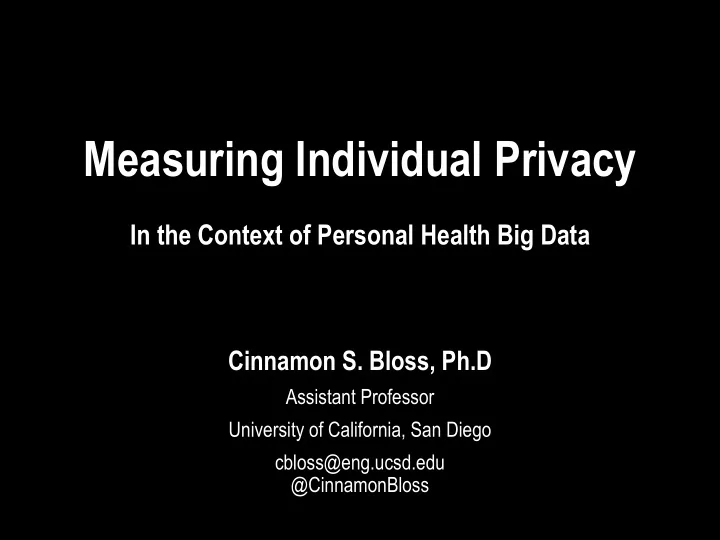

Measuring Individual Privacy In the Context of Personal Health Big Data Cinnamon S. Bloss, Ph.D Assistant Professor University of California, San Diego cbloss@eng.ucsd.edu @CinnamonBloss
Justice Scalia’s Privacy Legacy Privacy of the home Kyllo v. United States (2001) Held: Where the Government uses a device that is not in general public use, to explore details of a private home that would previously have been unknowable without physical intrusion, the surveillance is a Fourth Amendment "search," and is presumptively unreasonable without a warrant.
Privacy and security trade-offs
Privacy and big data
Privacy is discussed a lot, but do we really know what it means?
Samuel Warren and Louis Brandeis On the heels of inventions such as first to advocate a right to privacy, or photography & “right to be let alone" newspaper
Contemporary inventions enable generation of vast amounts of data
Data is highly granular and personal Currently flows outside of traditional medicine
Meaning of privacy in this context?
“a concept in disarray…nobody can articulate what it means” Daniel Solove “suffers an embarrassment of meanings ” Kim Lane Scheppele
Might privacy mean different things to different people?
Personal Thoughts Female, 6 th Grade & Possessions
“Places where I have a bandaid ” Male, 5 years old
Male, 12 th Grade “What’s in my mind”
“What happens in my house” Female, 20’s
“My Internet Activity” Female, 20’s
Impact of Privacy Environments for Personal Health Data on Patients Conceptualize, measure, and understand individual privacy affinities and responses with respect to PHD information technologies. RO1 HG HG008753 National Human Genome Research Institute Aim 1: Refine conceptual model of privacy through literature review, individual interviews, focus groups, consultation with experts, and analyses of preliminary data. Aim 2: Develop psychometrically sound instrument to measure individual Privacy Affinities and Privacy Environment Responses to personal health data technologies. Aim 3: Administer scale in a larger population and use it to explore the relationship between privacy and other factors, including propensity to adopt PHD technologies, propensity to share PHD for research, and disease type and stage.
Why should we seek to understand individual privacy? Understand people’s privacy -related behaviors Enhance patients’ (sense of) control of personal health data Develop approaches for addressing privacy concerns Promote user-centered design of health technologies & IT Enable safe data sharing for biomedical research Promote rigorous research on an ill-defined topic
Example from Clinical Depression Freud’s Psychoanalytic Theory Depression as “inverted hostility toward the self”
Original Measurement Tools
Beck Depression In Inventory ry (1 (1961) • Aaron T. Beck: regarded as the “I’m ugly/ The Self worthless/ father of Cognitive a failure” Behavioral Therapy (CBT) • Depression caused by negative cognitions about The Future The World self and present/future experiences “I’m hopeless “No one because things loves me” will always be this way.”
BDI items were informed by patients’ own descriptions of symptoms vs. description of symptoms by non-depressed individuals
Pubmed Artices on BDI PubMed articles utilizing 'Beck Depression Inventory' 1000 900 800 700 600 500 400 300 200 100 0 1950 1960 1970 1980 1990 2000 2010 2020
Privacy Study Recruitment and Sample Size
San Diego Community Liaison Committee
Privacy Conceptualizations Among Early Adopters • Interview data • Health Data Exploration • Personal Genome Project • 18 in-depth, semi-structured interviews • Qualitative data analysis of transcripts in Dedoose 6.2.21 • Research question: how do early adopters of public health data technologies conceptualize privacy?
Overall Findings The majority express ‘pragmatic’ privacy beliefs (privacy as a tradeoff) ~10% were completely privacy ‘unconcerned’ However, most participants still voiced privacy concerns despite being early adopters
Pragmatic “Science isn’t always the best, but in general I’m an absolute scientist and believe in evidence – based medicine. I think there’s too much out there that’s not really scientific. I think if the motives are good, and if the scientists …they’re honest people really trying to learn something as good scientists are … .I think the good far outweighs the possible negative things that could happen. ”
Unconcerned “I don't care about privacy. There's no such thing. Anything you put out there on a system is available to somebody else at some point at some level in some way. I just assume there is no privacy. I don't care about privacy. I really don't. I just don't put anything out there that I don't want people to have. ”
Fundamentalist Concerns “I am concerned about privacy and who has access to my information. Then Google shares that information as a result of a financial relationship they might have. … I don’t trust them to share my information with companies they acquire without telling me about it. ” “In all honesty, I have no desire to have my weight information, or any of my health information hosted by a private company that I don’t control access to. ”
Frequently Cited Specific Concerns Discrimination Data Security Re-identification Big Brother
“We’re going to make sure that protecting patient privacy is built into our efforts from Day 1,” Mr. Obama said.
Health and Fitness Sensor Privacy Policy Readability
Electronic Medical Record Portal Privacy Policy Readability
Need Trust
Acknowledgements California Institute of Telecommunications and Information Technology Health Data Exploration Project National Human Genome Research Institute Robert Wood Johnson Foundation University of California, San Diego Center for Wireless and Population Health Systems
Recommend
More recommend